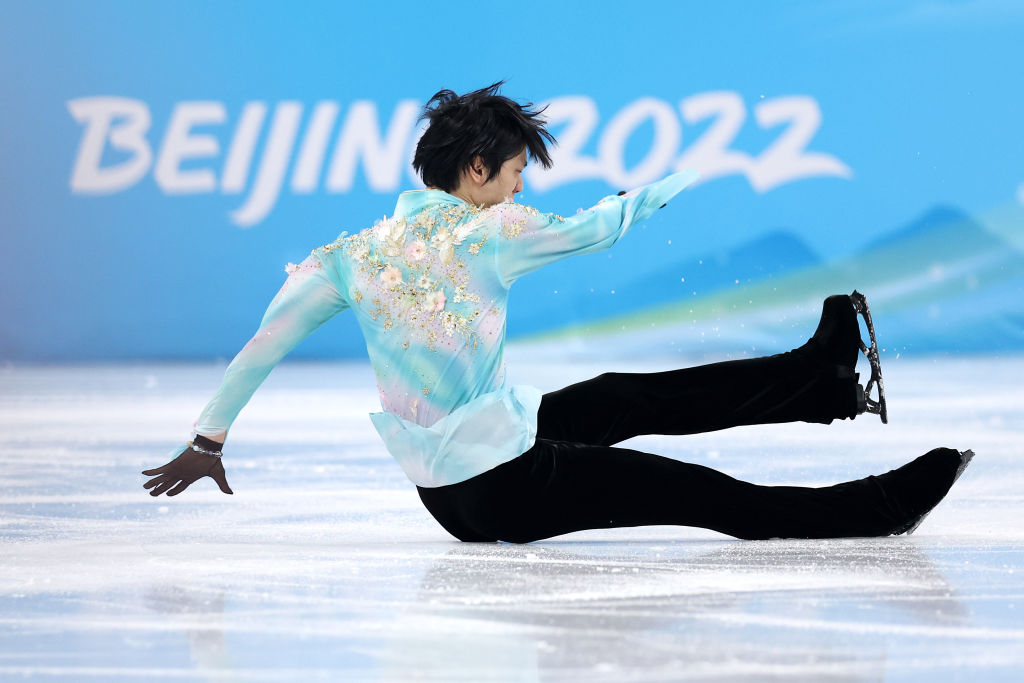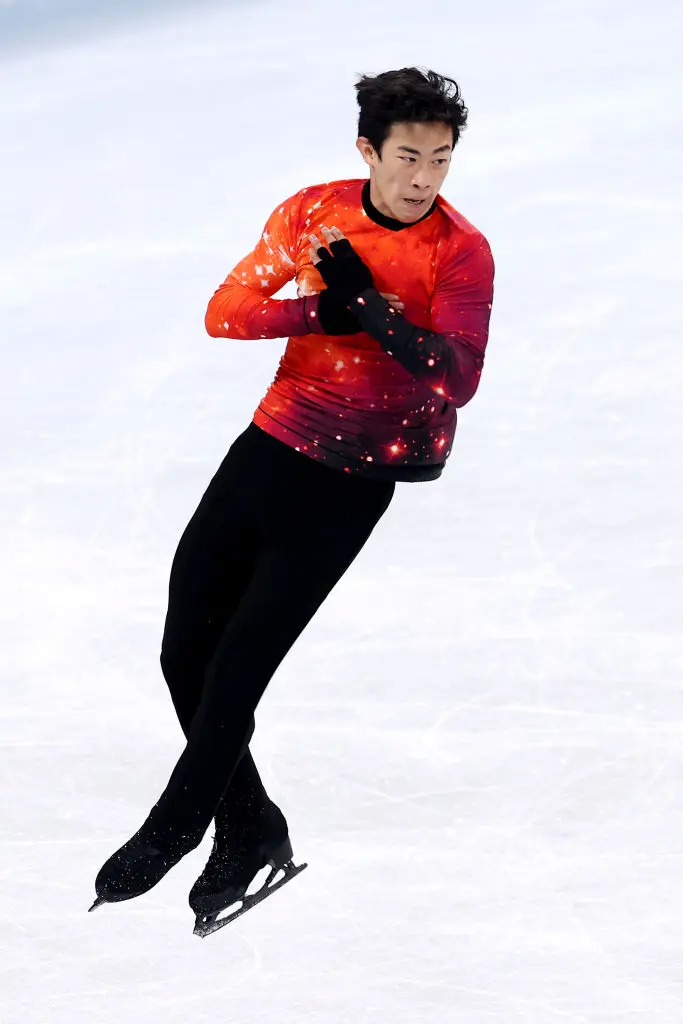It took two Olympic cycles, eight years of training and a pandemic, but U.S. figure skater Nathan Chen finally has his Olympic medal. And it’s gold.
The 22-year old Salt Lake City native skated the program of his life in Beijing’s Capital Indoor Stadium on Thursday afternoon to stand on top of the podium. Japan filled the remaining spots, with Yuma Kagiyama earning silver and Shoma Uno the bronze.
“I just had a blast out there,” said Chen, who skated to Elton John’s “Rocket Man.” “I’m so happy, that program is so much fun to skate.”
It was Chen’s gold to lose, just as it was heading into the Games four years ago, before he skated an uncharacteristically error-filled short program that prevented him from cracking the top three after the free program.
This time, it was different. Chen set a world record with his score in the short program on Feb. 8, easily taking the lead with a margin of almost six points. He lost none of that momentum entering the free program, effortlessly landing five quadruple jumps and cementing his reputation as one of the most accomplished men’s figure skaters in history.
Hanyu stumbles on quad Axel

Chen’s win breaks what Japan’s Yuzuru Hanyu was hoping to make a third consecutive Olympic title. Skating in character as he generally does, Hanyu portrayed an iconic Japanese war hero from the 1500s, known as the God of War. Despite being in eighth place after the short program, Hanyu had a weapon that could have propelled him to the medals podium—a quadruple Axel. It’s a jump that starts with a 12.5 base value, to which skaters can add high grade of execution points. Hanyu came close to becoming the first skater to ever land the jump, almost completing the 4.5 rotations in the air. But, he was just short and fell on the landing. Hanyu didn’t regret making the attempt, however. “No matter how hard, no matter how unimaginable, I want to push a little bit more for those who have expectations of me,” he said afterward. “That [attempt] was my pride. It’s going to make me more complete. That’s why I did it.”
Without the jump, however, and after falling on a different jump, Hanyu couldn’t make up the points he needed to reach the podium and ended up in fourth. But his teammates easily stepped in to claim their spots.
The youngster of the team at 18, Kagiyama skated away with silver at his first Olympics. Coached by his father, Kagiyama’s solid technique and charisma earned him the second highest free program score of the event, behind Chen—fitting for a skater who used to watch and study Chen’s programs on YouTube. He landed four quadruple jumps, and made a statement to the world that if Chen and Hanyu are the present, he’s the future of men’s skating.
Uno, the reigning Olympic silver medalist, also had five quad jumps planned, but fell on one of them, which led to an automatic one point deduction and a lower than expected score.
Chen finds redemption in Beijing

But it was Chen’s event, and he fittingly closed the session with a program that he, and skating fans, will remember for a long time. Talk to any of Chen’s support team, from his coach to his choreographers, and they all say the same thing—he knows what he wants. And this time, Chen wanted to prove that the two performances he had in Pyeongchang do not define him, and do not represent the level of skating he can achieve.
The last to skate, since the athletes compete in reverse order of the short program finish, and Chen was the leader entering the free program. Wearing a shirt with a galactic theme emblazoned with exploding stars appropriate for his music, Chen took a deep breath and looked almost satisfied to finally have the chance to bring his Olympic story full circle.
His program is one that he skated in the 2019-2020 season, but was unable to perform at the World championships after they were canceled due to COVID-19. Bringing the routine back ended up being a golden decision, as his comfort with the choreography and his experience having skated it at several competitions all helped to refine and polish all of its elements to near perfection. It wasn’t perfect — Chen singled last jump in a combination toward the end of the program — but it was still enough to hold on to the lead.
The program represents a bit of a departure for Chen, who normally skates to more abstract music selections. For this one, he approached noted ice dance coach and choreographer Marie-France Dubreuil, who coaches the top three U.S. ice dance teams in Montreal, including Jean-Luc Baker, with whom Chen is friends. “I was looking to change up the choreography, and had seen the amazing work that Marie-France was doing,” Chen told TIME before the Games. “One of my best friends, Jean-Luc was telling me what it’s like there, and I definitely wanted to try it out.”
Chen was attending Yale University at the time, so was able to make the trip up to Montreal—and he ended up spending several weeks in the city to work on the program. “I was very puzzled when he called,” says Dubreiul. “Normally my head likes to create for four legs, four arms, two heads and four eyes. When he called me, I said ‘Why?’ He insisted so I said, ‘Let’s play and see what happens.’”
Dubreuil was impressed with Chen’s focus and self confidence. “He knows what he needs, so the programs design themselves quite easily with him,” she says. When she saw him perform the program in the 2019-2020 season, “I was blown away by his performance. I thought right away that this is going to be a magical moment at World [Championships] in Montreal.”
That didn’t happen, but Chen had his moment with the program in Beijing, instead. Sam Chouinard worked with Chen while he was in Montreal to bring out the performer in him. The fast and boisterous dance sequence at the end—the audience and judge-pleaser— was largely Chouinard’s effort to show a different side of Chen, since he knew Chen’s athletic prowess would already be evident. He admits that he had to Google Chen’s name at first, since, as a hip hop dancer, he wasn’t as familiar with the headliners in the skating world. “I thought he really needed to push his artistic side,” he says. “When you’re doing solo skating, there is so much focus on the athletic side of it. But that artistic side is a little left behind. I tried to see if he can dance and perform when he is getting ready to jump, so it would be easier to tell the story and easier to keep the audience involved in what he was trying to do on the ice. When skaters understand the blend of the two, this is the perfect recipe for gold,” he says.
Indeed. For Chen, the gold brings him full circle — from his start in skating as a child on the practice rink for the 2002 Salt Lake City Olympics, and from his disappointing fifth place finish at his first Olympics in 2018. It’s validation for the long hours his mother spent driving young Chen from their home in Salt Lake City to Los Angeles, a couple times a month, where he started taking lessons when he was 12. “My mom has been with me since the first day I stepped on the ice, and even now is right by my side,” he told TIME. “When I was 12 we didn’t have the finances to afford flights, so driving was the only way to get me back and forth at the time.”
It finally paid off, with gold.
More Must-Reads From TIME
- The 100 Most Influential People of 2024
- Coco Gauff Is Playing for Herself Now
- Scenes From Pro-Palestinian Encampments Across U.S. Universities
- 6 Compliments That Land Every Time
- If You're Dating Right Now , You're Brave: Column
- The AI That Could Heal a Divided Internet
- Fallout Is a Brilliant Model for the Future of Video Game Adaptations
- Want Weekly Recs on What to Watch, Read, and More? Sign Up for Worth Your Time
Contact us at letters@time.com